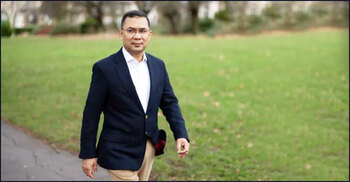DNA test confirms Harris Chowdhury’s identity

A DNA test conducted on remains exhumed from a grave in Savar, identified as Mahmudur Rahman, has matched those of the family of BNP leader Abul Harris Chowdhury.
The DNA test report was submitted before the High Court bench of Justice Fahmida Kader and Justice Mubeena Asaf on Wednesday (December 4). Following this, the HC bench allowed the late BNP leader’s family to re-bury his remains in a graveyard of their choice.
Earlier, on September 5, following a writ petition filed by his daughter, Barrister Samira Tanzin, the High Court had ordered a DNA test on the exhumed body to determine the identity of Harris Chowdhury.
In 2021, media reports stated that on September 4 of that year, Harris Chowdhury, former political secretary to former Prime Minister Khaleda Zia and a former BNP leader, was buried under the name 'Mahmudur Rahman' in a madrasa graveyard in Jalalabad, Savar, Dhaka.
Harris Chowdhury’s daughter explained that the recently ousted authoritarian government’s intelligence agencies had staged a drama to question her father’s death.
The media continuously reported on the uncertainty surrounding Haris Chowdhury’s death, which remained unresolved. His daughter filed the writ to ensure no further questions would be raised about her father’s death.
Samira said, “As a daughter, it is deeply painful and distressing to live with doubt about my father’s death. Even now, people ask if he has really passed away! We are being harassed. That is why I turned to the court to put an end to this, and the court has not disappointed us.”
Following the DNA test, the court issued a ruling questioning why a death certificate for Abul Haris Chowdhury should not be issued, why the Interpol Red Notice against him should not be withdrawn, and why he should not be buried with appropriate respect as a war hero in his home district, in accordance with his final wishes.
The Ministry of Home Affairs, Ministry of Local Government, Registrar General (Birth and Death), CID Director, Dhaka District Police Superintendent, and the Officer-in-Charge of Savar Model Police Station have been ordered to respond to the ruling.
In 2007, after the declaration of a state of emergency, Haris Chowdhury, along with his wife, went to his ancestral home in Darpanagar, Kanaighat, Sylhet. After midnight, his personal assistant Atiq informed him that joint forces were raiding the homes of BNP leaders in Dhaka. A few hours later, the joint forces raided Haris’s house, but by then, he had already fled. After hiding for a while in different places in Sylhet, he crossed the Jaintapur border into India on the night of January 29 of that year. He went to his maternal home in Badarpur, Assam, and continued to travel abroad from there.





